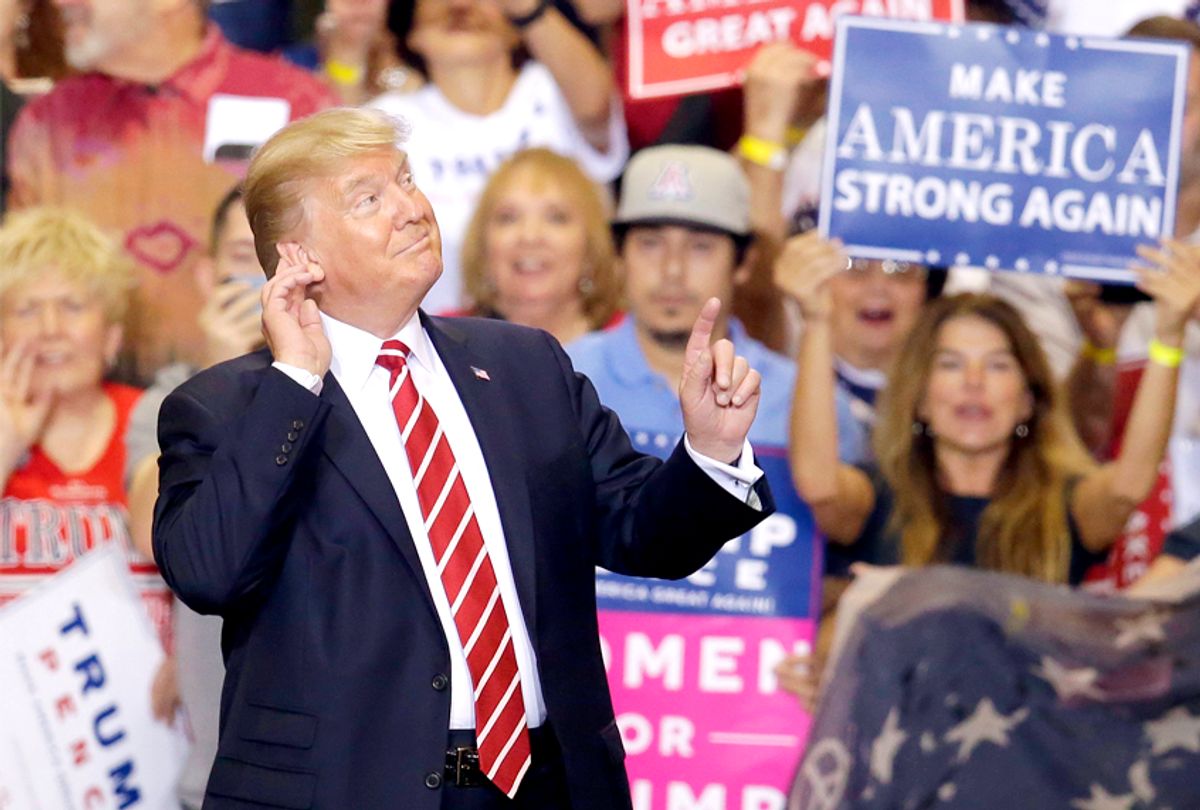More than a year after Donald Trump performed a hostile takeover of the Republican Party, it is still remarkably unclear as to where the party is headed. As the 2016 primaries made clear, the GOP electorate wasn't very interested in traditional discussions about cutting social programs or cutting taxes, that much is certain. Trump's own general indifference toward policy has only prolonged the uncertainty.
While he essentially copied several Democratic themes in his campaign, once in office, Trump basically allowed Senate and House Republican leaders to control the policy specifics of every major legislative push. This has presented a problem for Trump, because most conservative and libertarian economic views are extremely unpopular and thus toxic to Republican elected officials who hail from swing states and districts like Maine's Sen. Susan Collins or Alaska's Sen. Lisa Murkowski.
One thing on which most Republicans seem to agree is a distaste for their party's congressional leaders. In a survey released last week by CNN, only 39 percent of GOP respondents said they approved of the job being done by the Republicans in Congress, a huge drop compared to the 77 percent who said that in January. A poll also released last week by Quinnipiac University found that 61 percent of Republicans disapproved of the job their party leaders were doing in Washington.
In some measure, the dropoff is due to the "conservative establishment" of activist groups and talk radio hosts who have convinced a portion of right-leaning America that the GOP is too centrist. Though this Tea Party faction isn't that large, they are a very vocal and wealthy minority, thanks to talk radio and Fox News.
Despite the loud noises from the professional right, however, it appears the larger reason that Republican voters have soured on congressional Republicans is that they have yet to pass any significant pieces of legislation, despite many months of effort. Trump himself has only encouraged this interpretation, effectively trying to wall himself off from the increasingly unpopular Mitch McConnell and Paul Ryan. He's actually attacked fellow Republicans more on Twitter than Democrats, according to Washington Post analyst Christopher Ingraham.
The effort seems to have worked. Among Republicans, Trump continues to enjoy much higher approval numbers than the congressional GOP. In the CNN poll mentioned above, 82 percent of Republican respondents said that they believed the president was moving the party in the right direction.
While Trump appears to have more goodwill from his co-partisans than McConnell and Ryan, even his appeal to them seems to have its limits. Last week in Alabama, Republican voters there rejected the president's endorsement of incumbent Sen. Luther Strange and opted for radical Christian nationalist Roy Moore. A similar fate befell Renee Ellmers, a congresswoman from North Carolina who lost a primary race last June, despite getting the Trump seal of approval after she was one of his earliest supporters.
With GOP voters rejecting his political picks and Trump's refusal to lead on policy, the conservative establishment and the traditional business-friendly Republicans are competing over who makes the best presidential ally by dressing up their long-standing political views in Trumpian "greatness" rhetoric. This is more than a little absurd, because both the Republican elites and their far-right antagonists opposed Trump until he defeated all the other GOP candidates last year.
A third faction, one that actually supported Trump in the primaries, is also vying for the Republican mind and trying to push a conservatism that is more about trade protectionism and immigration control than slashing taxes. Because of their fledgling nature, however, these "nationalists" have generally aligned themselves with the Tea Party wing due to their mutual hatred of Republican elites.
The most prominent leader of this faction is Steve Bannon, the former White House adviser who has returned to his former digs at Breitbart News and is vowing to take down Republicans who he sees as insufficiently obedient to his version of the Trump agenda.
The new kid on the block is an advocacy group that launched last month led by two pro-Trump writers known for promoting conspiracy theories and their former association with the "alt-right." The two men, Jack Posobiec and Mike Cernovich, are teaming up with a third named Jeff Giesea to launch a PAC called #Rev18 in preparation for next year's GOP primaries.
Following Bannon's Alabama intervention on behalf of Roy Moore, #Rev18 is hoping to make endorsements in 12 to 13 congressional races, according to a report from the Columbus Dispatch. Their first endorsee is Ohio Treasurer Josh Mandel, who is running for Senate this year in the state's Republican primary. Mandel has not publicly responded to the PAC's endorsement, but he has defended both Cernovich and Posobiec after they were put on a list of "alt-lite" figures by the Anti-Defamation League.
Aside from the two failed incumbent endorsements mentioned above, the Trump White House has largely avoided playing in Republican primaries. Given Trump's love of campaigning, however, this is likely to change. Already, it's become apparent that some administration officials would be more than happy to oblige him.
In a speech delivered to members of the Republican National Committee earlier this week, Nick Ayers — Vice President Mike Pence's chief of staff — told the gathering that they should stop giving money to GOP elected officials who they see as not supporting Trump enough.
What is needed according to Ayers, was a "purge" of disloyal Republicans.
"Just imagine the possibilities of what can happen if our entire party unifies behind him?" he asked, according to a Politico report of the speech. "If — and this sounds crass — we can purge the handful of people who continue to work to defeat him?"
Under further questioning by the local Republican leaders, Ayers stressed that he was "not speaking on behalf of the president or vice president when I say this."
In a few months, that statement will likely need to be updated.



Shares